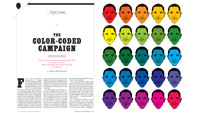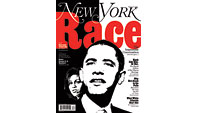
1. A powerful theme emerged in the responses to John Heilemann’s argument that Barack Obama’s lead in the polls over John McCain is constrained by fears of a black presidency (“The Color-Coded Campaign,” August 18), and it goes something like this: Well, I don’t like Obama, and I’m not a racist. My opposition is based on his inexperience and/or his radical liberalism. Some added a heavy dose of sarcasm, such as: “May I grovelingly apologize for being exposed as a vicious white racist because I openly mock Mr. Obama for having a résumé thinner than an anorexic supermodel, but with all her foreign-policy chops.” The blog Strategy ’08 took issue with Heilemann’s contention that in the primaries, Obama consistently underperformed relative to the poll numbers, suggesting that potential supporters had last-second misgivings about supporting a black candidate (the so-called “Bradley effect,” named for former Los Angeles mayor Tom Bradley): “In Wisconsin, Virginia, and numerous other states, Obama’s actual performance was way over what every poll actually suggested it would be.” The blogger then went on to cite an analysis showing that “averages across all states show that polls UNDERSTATED Obama’s support by about 3.3 percent.”

2. Another theme in the comments about both Heilemann’s story and the other articles in last week’s race issue was the opinion that simply talking about race perpetuates the problem. Patricia J. Williams also took heat for the opening anecdote in her analysis of how whites and blacks understand racism differently (“Talking About Not Talking About Race”). Williams described partially overhearing a conversation in which two white women discussed their ambivalence about Obama, and several readers faulted her for speculating about things she didn’t actually hear them say. But her story also elicited many expressions of gratitude, as well as positive notice from political blogs. Vanessa Grigoriadis’s examination of the Obamas’ marriage (“Black and Blacker”) drew its share of ad hominem, Web-style attacks, though a few kind words were thrown in, too, such as: “Thank you for your unflinching portrait of Michelle Obama. She is the archetype of the Black mother—strong, smart, resourceful, protective, stylish, and with a strong sense of humor!”
3. A new installment of the Sex Diaries, a week’s worth of physical encounters from an anonymous New Yorker, is posted every Monday on nymag.com’s Daily Intel blog, and typically, the comments pile right up, providing an interesting glimpse into the psychology of our readers. Apparently, nothing is easier to solve than someone else’s sexual dilemmas. Advice is dispensed freely; one recent example was The Possibly Cuckolded Wall Street Dad (June 16), who revealed the circumstantial evidence of his wife’s infidelity. Readers wanted to help him see the obvious: “Yup, she’s cheating”; “Solution: Get a dog”; “Is there any way we can get her to write one of these now? I bet it’s a shag-a-thon.” Readers often remark that the subjects are having too much sex—or, depending on the week, too little—and there is a semi-regular chorus of complaint that the diaries are all fabricated. How can they tell? Well, one argument goes, the men sound like women. “Ladies,” advised a skeptic, “if you’re going to try impersonating the men in print, please stay away from the flowery or subtle language. It’s a dead giveaway.” An intrepid soul has even started a mock tribute Website called Fake Sex Diaries. (For the record, while we cannot possibly guard against all embellishments, the diarists are real people, and they are subjected to a series of questions designed to catch inconsistencies.) We’ve noticed, too, that readers respond less to the actual sex in the diaries than to emotional complexity and depth of feeling. And the feedback is not always harsh. Last week’s 33-Year-Old Yearning for His First Real Relationship (August 11) nearly tipped the comments section into the Oprah zone: “You know what you’re looking for—and you’ll find him! Trust yourself.”
4. Soap operas may be dying off, but there are still fierce loyalists out there, and we heard from them about Lauren Mechling’s story on the infusion of reality-show elements into Guiding Light (“The Culture Pages: Guiding Light,” August 18). “Are you kidding me? Ellen Wheeler save soaps? She’s killing Guiding Light! It isn’t just her take on reality TV; it’s the writing. Under her guidance, Guiding Light has taken strong, confident, capable female characters and reduced them to man-hungry baby-making machines.” Another fan simply pleaded for untrendy escapism: “We do want that ‘Calgon, take me away’ moment.”
In “The Color-Coded Campaign,” John Heilemann wrote, “In October, [Barack] Obama’s former pastor, [Reverend Jeremiah] Wright, will publish a new book and hit the road to promote it … ” This assertion was based on Wright’s public statement in April that he had a book in the works that would appear before the end of the year, as well as on statements by a number of Democrats, including some on Obama’s staff, that they were bracing for an October publication. But according to Wright’s daughter Jeri, no such book by her father will be published in that time frame. In the same article, Heilemann wrote that Obama’s “African grandfather fought in Patton’s army.” In fact, it was Obama’s other grandfather, his mother’s father, who did so.
In “What Do Crack Cocaine and Journalism Have in Common?” (August 11), Al Siegal should have been identified as assistant managing editor, not managing editor, of the New York Times.
Please send e-mails to: [email protected]